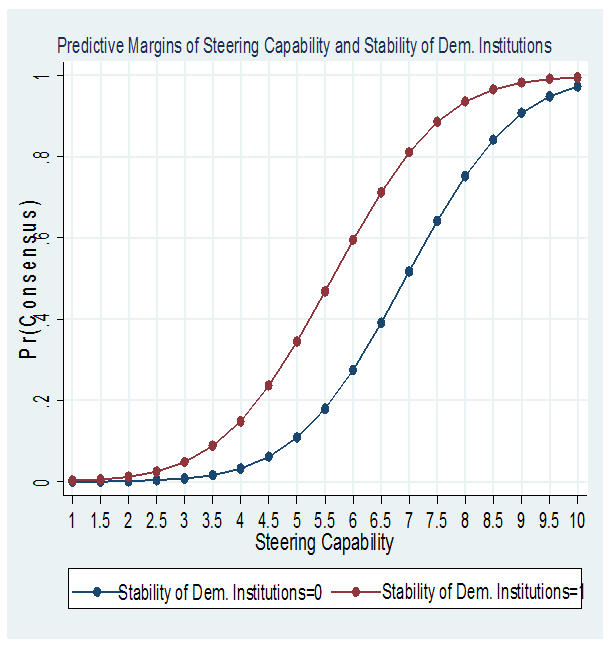We consider this week some of the institutional pre-requisites that are often found to increase the likelihood of consensus building. We start our study by running a logistic regression on key variables we consider of high importance in predicting the probability of reaching a compromise among various parties that are taking part in this national debate.
Our dependent variable, Consensus Building, measures three key dimensions; (a) The extent to which the major political actors agree on certain economic and political principles as strategic long-term goals (e.g., democratic regime, market economy, etc); (b) How political leadership can manage internal cleavages so that they do not escalate into irreconcilable conflicts; and finally, (c) Is political leadership able to ensure the participation of civil society in the political process and to bring about reconciliation between the victims and perpetrators of past injustices. To estimate the probability of occurrence of the above dummy variable, three variables are included in our small model as regressors; Steering Capability which evaluates the effectiveness of the government or political leadership in implementing reform policy and their capacity to innovate or to learn from past errors; Political and Social integration which examines; (a) the presence of active and moderate network of associations and interest groups to mediate between society and the political system and; (b) the level of commitment by local citizens to universal values. The last variable, Stability of democratic institutions measures the overall performance levels of democratic institutions, including the administrative and judicial systems and how the latter are accepted and supported by the relevant actors.
Our study, based on data from100+ countries over the period from 2006 to 2012, show that the likelihood of reaching a consensus on key national issues substantially increases particularly where high level of political and social integration are in place. Combining the above impact with the nature of democratic institutions in the country, graph 1 depicts a more favorable influence in presence of stable institutions. This interaction consistently outperforms any competing models (featuring countries with no stable institutions) in predicting the probability of a successful consensus building process at any given time. An analogous finding is shown in graph 2 where we demonstrate that the effectiveness of governance practices and leadership skills play very often a major role in finding a common and mutually accepted compromise for the negotiations among local actors. It is surprising to note that while a certain gap exists between those cases with and without stable institutions, we note that both curves rapidly converge towards a high predictability performance as the level of government effectiveness increases, regardless of the nature of institutions in place. This finding speaks unequivocally to the importance of a strong political leadership in place which could (in certain circumstances) fill the gap that might result from the lack of alternative prerequisite conditions.
This short study confirms our initial thoughts that while building trust and consensus among local actors might turn out to be a long and quite difficult task, certain conditions could substantially increase the probability of ensuring that not only opponents are willing to sit around the same table but more importantly that they are ready to set aside their narrow (political) self interest to reach instead a common goal which will ultimately benefit to everyone. It simply boils down to political leadership, active and moderate parties and beyond all a fundamental respect and commitment toward the national interests.
This note is prepared by Bechir Bouzid, Tuness Reserach Team.
Data Source:
http://www.bti-project.org/home/index.nc


